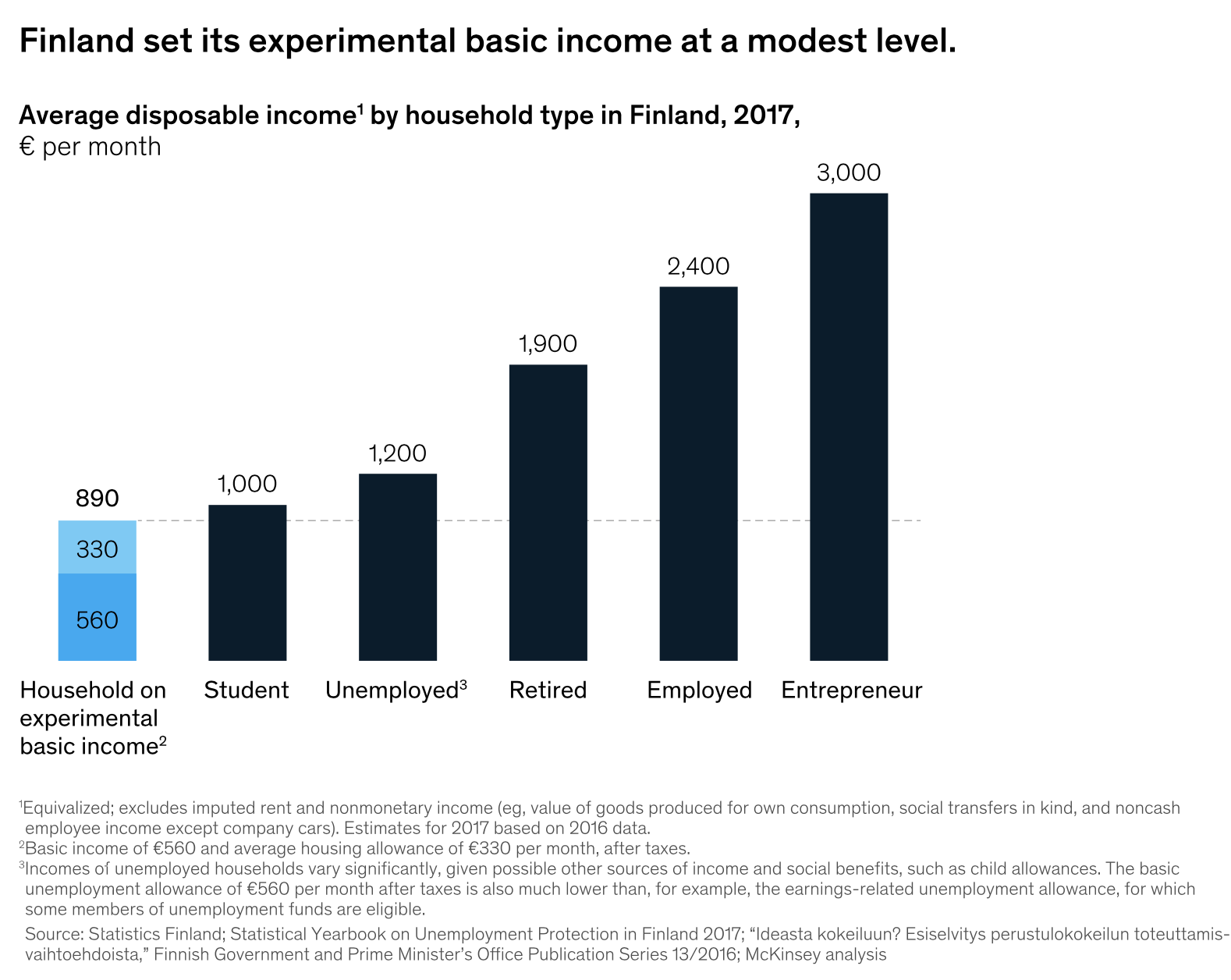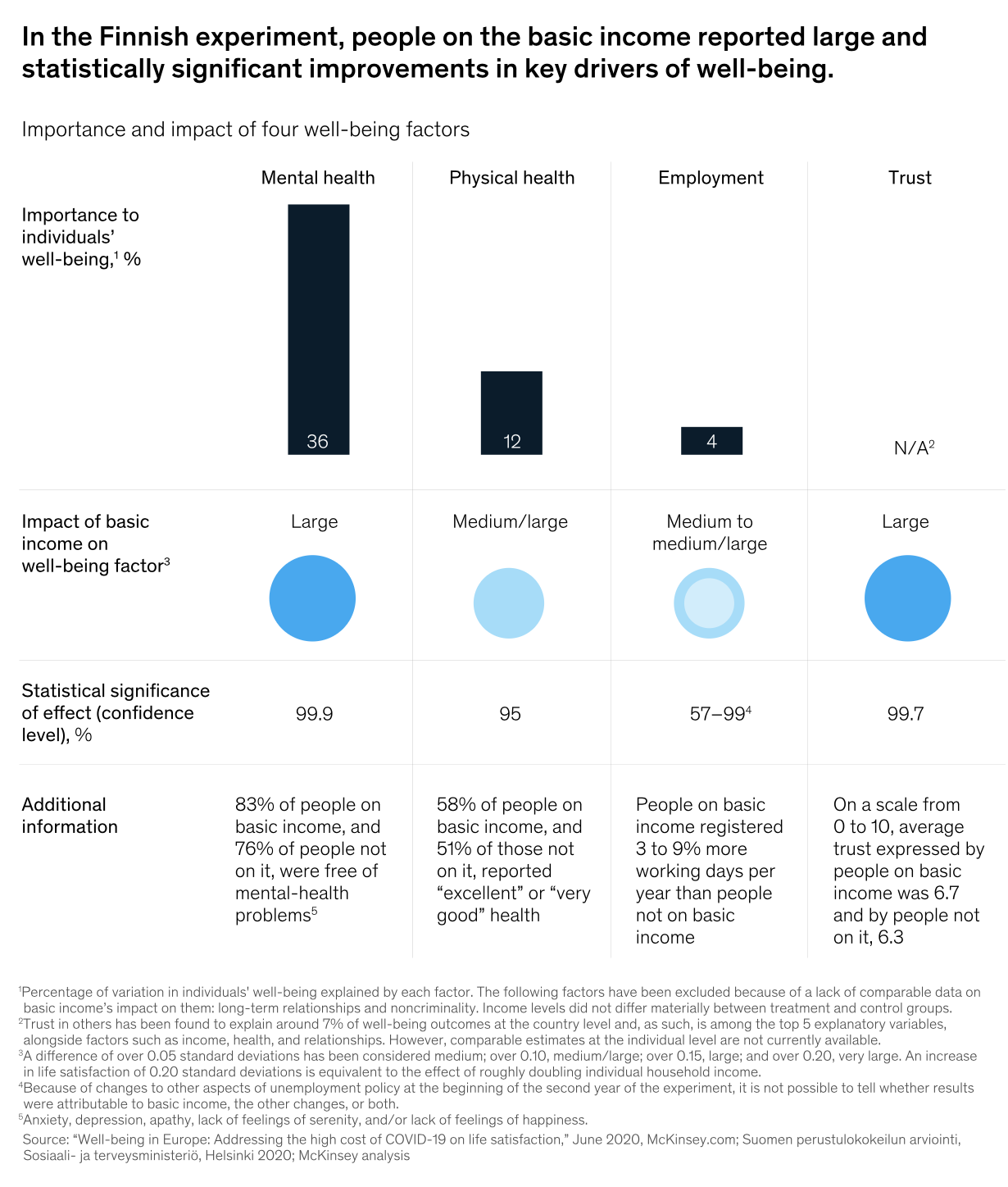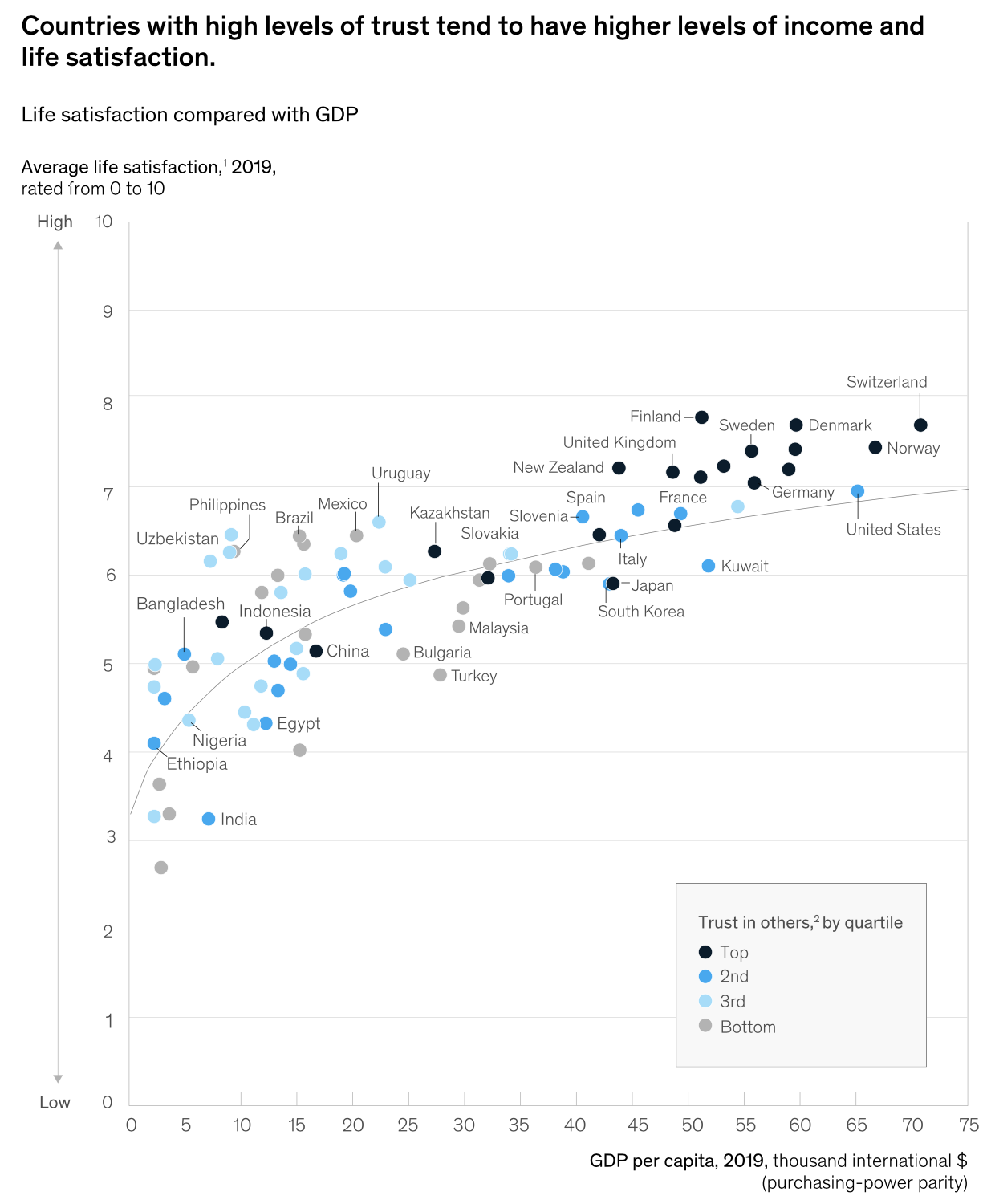McKinsey zu den Vorteilen des Bedingungslosen Grundeinkommens
Ich habe mich in der Vergangenheit wiederholt kritisch zum Bedingungslosen Grundeinkommen geäußert. Vor allem vier Punkte machen mich skeptisch:
- Die enormen Kosten führen sehr schnell zu einem deutlichen Umverteilungsmechanismus.
- Den wirklich Bedürftigen hilft es wenig, sie werden sogar schlechter gestellt.
- Angesichts der Demografie brauchen wir eher mehr als weniger Menschen in Arbeit.
- Die Vermutung liegt nahe, dass das Grundeinkommen dann nicht „bedingungslos“ bleibt, sondern nach und nach „gesellschaftlich gewünschtes Verhalten“ voraussetzt.
Nun wäre bto nicht bto, wenn ich nicht auch andere Meinungen bringen würde, vor allem, wenn sie von so angesehenen Institutionen wie McKinsey kommen. Hier also die Sicht der Beratung auf das finnische Experiment:
- „As typically conceived, basic-income programs are meant to provide a financial safety net, with no obligations and without the bureaucracy and associated administrative costs of means-tested benefits. Trends in globalization and automation, as well as the rapid rise in the cost of necessities, such as housing, had already started to put pressure on social contracts in many countries before the pandemic. Now, with COVID-19 creating additional economic risks—especially for already-vulnerable groups—questions about how best to support people living on low incomes are bound to become even more important.“ – bto: Da frage ich mich, ob das in Deutschland gilt. Hier haben wir ein funktionierendes System und nur die Soloselbstständigen fallen durch das Netz. Dies ist politisch scheinbar gewollt, wäre es doch ein leichtes gewesen, Umsatzausfallzahlungen zu leisten.
- „The body of quantitative evidence for or against a universal basic income (UBI) is still slim. The context and design of the first wave of policies, from 1960 to 1980 and primarily in North America, make the results hard to generalize. In the 2000s, a new wave of experiments—some funded by charities rather than governments—has sprung up. Municipalities in the Netherlands, Barcelona in Spain, the US city of Stockton, in California, the Brazilian city of Maricá, and the province of Gyeonggi in South Korea are among the places experimenting with a basic income.” – bto: Und wir wissen, dass die spanische Regierung darüber nachdenkt.
- „However, to date Finland is the only country that has managed to complete a nationwide randomized control trial of a basic-income program. The research methods used were particularly diverse and included literature reviews, microsimulations, surveys, data linking, in-depth interviews, and media analysis. (…) More research is needed in this multifaceted and complex area, not least because of the many unanswered questions on how a universal basic income could be funded—and how it would interact with other sources of government assistance.” – bto: Ich frage mich ohnehin, ob man das “testen” kann und muss. Es ist offensichtlich, dass diese Zahlungen unterschiedlich wirken, je nach Motivation des Begünstigten. Da wir aber viele Berufe haben, die ausgeübt werden müssen, auch wenn sie keine Freude bereiten, brauchen wir den finanziellen Anreiz. Den wegfallen zu lassen, halte ich für falsch.
- „In Finland’s two-year study, a treatment group of 2,000 randomly picked, initially unemployed people received a guaranteed, unconditional, and automatic cash payment of a modest €560 per month instead of a basic unemployment allowance in similar amounts. Even with a housing allowance, which basic-income recipients were eligible for, this level of support was significantly below the incomes of most Finnish households (Exhibit 1). All other unemployed people, who continued to receive standard benefits, formed the control group.“ – bto: Wir haben bereits ein solches Grundeinkommen in Deutschland, was faktisch keine großen Bedingungen voraussetzt. Es gibt keinen Arbeitszwang und er wird auch nicht durchgesetzt/angemahnt. Bei uns sind bereits 1000 Euro pro Kopf im Gespräch …

Quelle: McKinsey
- „The final results from Finland’s experiment are now in, and the findings are intriguing: the basic income in Finland led to a small increase in employment, significantly boosted multiple measures of the recipients’ well-being, and reinforced positive individual and societal feedback loops.“ – bto: Es ist also ein Traum: Wir arbeiten mehr, sind glücklicher und die Gesellschaft besser. Da bin ich gespannt!
A small increase in employment
- „Many policy makers assume that an entirely unconditional guaranteed income would reduce incentives to work. After all, the argument goes, why bother with a job if you can have a decent life without one? This assumption has led many countries to deploy active labor-market policies that require people on unemployment benefits to prove their eligibility continually and, often, to participate in some kind of training or to accept jobs offered to them.” – bto: Ich gehöre in dieses Lager. Und es dürfte schwer sein, mich davon zu überzeugen. Nicht wenige Hartz-IV-Empfänger wollen nicht arbeiten – ich habe selbst solche Fälle kennengelernt – und bevorzugen die Kombination aus staatlichen Leistungen und gelegentlichen Hinzuverdiensten im Graubereich.
- „Interestingly, the final results of Finland’s program, released this spring, found that a basic income actually had a positive impact on employment. People on the basic income were more likely to be employed than those in the control group, and the differences were statistically significant, albeit small. Concurrent changes in other unemployment policies make it difficult to ascertain, from this study, whether the basic income, the other changes, or both were responsible for the higher employment levels. However, something about the modest level of the basic income and the lack of conditions attached to receiving it seems to have motivated recipients to seek and accept work they otherwise might not have.” – bto: Mit Blick auf Deutschland würde ich denken, dass der entscheidende Unterschied ist, dass die Hartz-IV-Zahlungen schnell sinken, wenn man anfängt zu arbeiten, mit einer Grenzbelastung von bis zu 80 Prozent. Dann hat dieser Effekt aber nichts mit dem BGE zu tun, sondern mit der Tatsache, dass das Geldverdienen nicht bestraft wird.
- „A critical lesson of the Finnish experiment is the complexity of implementing a basic income. Policy makers need to decide how it should interact with a large number of other policies, such as child benefits, housing benefits, pensions, health insurance, and taxation; for example, in the Finnish experiment, basic-income recipients were eligible for housing allowances but not for basic social-assistance payments. Unless such linkages are streamlined, they could detract from a basic-income system’s potentially considerable savings in administrative costs.“ – bto: Es macht nur Sinn, wenn es keine weiteren Zahlungen gibt und es einheitlich ist. Wir müssen dann akzeptieren, dass es eben nicht “gerecht” ist. Man kann von dem Geld auf dem Land besser leben als in München beispielsweise.
A huge boost to well-being
- „However you read the findings on employment, other effects were clear: people on the basic income reported significantly better well-being on multiple dimensions. Average life satisfaction among the treatment group was 7.3 out of 10, compared with 6.8 in the control group—a very large increase. To experience a similar lift in life satisfaction, we estimate that a person’s income would need to go up by as much as €800 to €2,500 per month—60 to 170 percent of the average per-capita household income in the European Union. Indeed, the difference was big enough to erase the gap in life satisfaction between unemployed and employed people.“ – bto: Also, auch das ist ja irgendwie klar. Man muss nicht mehr zum Amt gehen. Es wirkt etwas wie ein Vermögenswert, den man hat, der einen absichert, ohne sich rechtfertigen zu müssen. Dennoch bleibe ich dabei, dass wir das gleiche Ziel auch anders erreichen könnten und zusätzlich der Arbeitseffekt nicht so sicher ist, wie nach dieser Studie postuliert.
- „(…) the basic income seems to have improved all the major components of life satisfaction (Exhibit 2). People receiving the basic income reported better health and lower levels of stress, depression, sadness, and loneliness—all major determinants of happiness—than people in the control group. Recipients of the basic income also demonstrated more confidence in their cognitive skills, assessing their ability to remember, learn, and concentrate at higher levels than the control group did. And the basic income enabled people to perceive their financial situation as more secure and manageable, even though their incomes were no higher than those of people in the control group. Finally, basic-income recipients expressed higher levels of trust in their own future, their fellow citizens, and public institutions.“ – bto: Hier wäre es interessant zu wissen, welchen Hintergrund die Probanden hatten. Ich denke an die stark wachsende Gruppe der Hartz-IV-Empfänger in Deutschland – Migranten, bei denen gerade eine hohe Erwerbsbeteiligung angestrebt werden sollte, ist doch der Arbeitsplatz eine wichtige Voraussetzung für Integration. Wenn wir nur ein BGE zahlen, verfestigen wir Parallelgesellschaften, wissen wir doch, dass ein BGE in Deutschland über dem BIP pro Kopf in der Türkei liegt.

Quelle: McKinsey
Positive feedback loops
- „The Finnish study finds that the basic income unlocked at least two virtuous cycles: one that operates at the level of individuals (and their families) and another at the level of society. At the individual level, a monthly, guaranteed, and entirely unconditional cash sum had a liberating effect on many recipients. Better feelings of health, happiness, cognitive abilities, and financial security seem to have instilled a sense of confidence that encouraged the recipients to branch out and to seek more expansive opportunities: unpaid work, training, or employment.“ – bto: Das glaube ich alles, die Frage ist dennoch, ob dies ein Nutzen ist, den wir erreichen können, wenn es für alle Bürger gilt und vor allem die damit verbundenen Kosten von anderen Bürgern getragen werden müssen.
- „At a societal level, Finland’s basic-income experiment promoted another interesting virtuous cycle, around trust. Trust in others and institutions is a fundamental building block of well-functioning societies. (…) Indeed, Finland is a case in point: it ranks at the top of global measures of happiness and also boasts the second-highest rating on trust in other people, after Norway (Exhibit 3). (…) so it isn’t trivial that Finland’s basic-income program improved that level of trust. At the end of the two years, basic-income recipients registered elevated levels of trust in other people and institutions, (…) One explanation could be that the basic-income experiment did not involve bureaucracy, another that the recipients felt society—or ‘the system’—was not neglecting people who had fallen on hard times.“ – bto: Und was ist mit dem Vertrauen jener, die dennoch aufstehen, arbeiten und mehr Abgaben zahlen, um das zu finanzieren, vor allem wenn es zu einem immer größeren Anteil an Migranten fließt, die dann (noch) weniger Notwendigkeit zur Integration sehen?

Quelle: McKinsey
- „As a result, the experiment does offer an object lesson in the complexity of designing and implementing a randomized control trial of basic income. Nevertheless, more research on basic income is required. We can hope that Finland’s example will inform and inspire others as they set up their own experiments.“ – bto: Na, dann ist es doch schön, dass das DIW das jetzt auch macht. Ich denke, wir sehen den Elefanten im Raum erneut wieder nicht: Ein Sozialstaat mit offenen Grenzen funktioniert nicht.
→ mckinsey.com:”An experiment to inform universal basic income”, 15. September 2020







